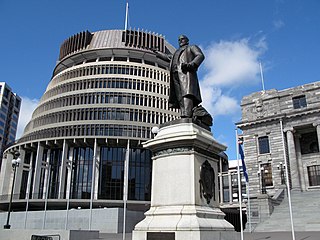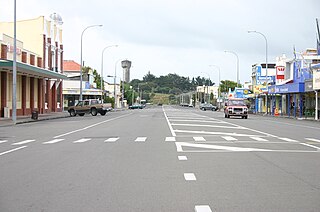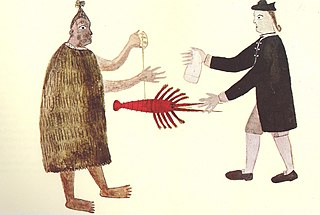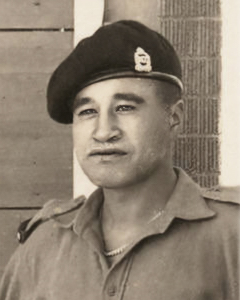Related Research Articles

Wellington is the capital city of New Zealand. It is located at the south-western tip of the North Island, between Cook Strait and the Remutaka Range. Wellington is the third-largest city in New Zealand, and is the administrative centre of the Wellington Region. It is the world's southernmost capital of a sovereign state. Wellington features a temperate maritime climate, and is the world's windiest city by average wind speed.

New Zealand literature is literature, both oral and written, produced by the people of New Zealand. It often deals with New Zealand themes, people or places, is written predominantly in New Zealand English, and features Māori culture and the use of the Māori language. Before the arrival and settlement of Europeans in New Zealand in the 19th century, Māori culture had a strong oral tradition. Early European settlers wrote about their experiences travelling and exploring New Zealand. The concept of a "New Zealand literature", as distinct from English literature, did not originate until the 20th century, when authors began exploring themes of landscape, isolation, and the emerging New Zealand national identity. Māori writers became more prominent in the latter half of the 20th century, and Māori language and culture have become an increasingly important part of New Zealand literature.

Foxton is a town in the Manawatū-Whanganui region of New Zealand - on the lower west coast of the North Island, in the Horowhenua district, 30 km (19 mi) southwest of Palmerston North and just north of Levin. The town is located close to the banks of the Manawatū River. It is situated on State Highway 1, roughly in the middle between Tongariro National Park and Wellington.

Westport is a town in the West Coast region of the South Island of New Zealand. Established in 1861, it is the oldest European settlement on the West Coast. Originally named Buller, it is on the right bank and at the mouth of the Buller River, close by the prominent headland of Cape Foulwind. It is connected via State Highway 6 with Greymouth, 100 kilometres (62 mi) to the south, and with Nelson 222 kilometres (138 mi) in the northeast, via the Buller Gorge. The population of the Westport urban area was 4,250 as of June 2023. The Buller District had a population of 9,670.

This is a timeline of the history of New Zealand that includes only events deemed to be of principal importance – for less important events click the year heading or refer to List of years in New Zealand.

Hone Peneamine Anatipa Te Pona Tuwhare was a noted Māori New Zealand poet. He is closely associated with The Catlins in the Southland region of New Zealand, where he lived for the latter part of his life.

The Department of Labour was a New Zealand public sector organisation tasked with improving the performance of the labour market and, through this, strengthening the economy and increasing the standard of living.
Tungia Dorothea Gloria Baker was a New Zealand actor, weaver, and administrator. Her notable acting roles included Ngahuia in the 1980s television drama Open House and Hira in the 1993 film The Piano. Baker was influential in contemporary Māori theatre, Māori film making and Māori arts. She named the Taki Rua Theatre, and was a founding member of Māori artists' collectives Te Manu Aute and Haeata.
Te Puni Kōkiri is the principal policy advisor of the Government of New Zealand on Māori wellbeing and development. Te Puni Kōkiri was established under the Māori Development Act 1991 with responsibilities to promote Māori achievement in education, training and employment, health, and economic development; and monitor the provision of government services to Māori. The Māori name means "a group moving forward together".

Sir Stephen Gerard "Tipene" O'Regan is a New Zealand academic and company director.
Hōne Te Kāuru Taiapa, also known as John Taiapa, was a Māori master wood carver and carpenter of Ngāti Porou. He was the younger brother of master Māori carver Pine Taiapa. The two brothers worked closely with politician Sir Āpirana Ngata on reintroducing the Māori arts & crafts to the country after World War II. Both men, for example, demonstrated Māori carving skills by carving and restoring lost or damaged traditional marae all along the North Island of New Zealand alongside fellow carvers or students they had been training as part of a programme by the New Zealand Department of Education to educate teachers to reintroduce Māori arts and crafts to school children. New Zealand poet Hone Tuwhare included a poem about the wood carver, "On a theme by Hone Taiapa," in his 1973 collection Something Nothing.

Toi whakairo or just whakairo (carving) is a Māori traditional art of carving in wood, stone or bone.

Hone Vivian Kouka is a New Zealand playwright. He has written 13 plays, which have been staged in New Zealand and worldwide including Canada, South Africa, New Caledonia and Britain. Kouka's plays have won multiple awards at the Chapman Tripp Theatre Awards, the 'Oscars' of New Zealand theatre. Kouka has also worked as a theatre director and producer. In 2009, Kouka was appointed a Member of the New Zealand Order of Merit, for services to contemporary Māori theatre.
Rangikaiamokura Wirihana Hetet is a Māori master carver of Ngāti Tuwharetoa and Ngāti Maniapoto descent.
Pineamine "Pine" Taiapa (1901–1972) was a notable New Zealand wood carver, farmer, rehabilitation officer, writer and genealogist. He was one of the first students of the School of Māori Arts in Rotorua under Āpirana Ngata. As a carver he was part of over ninety-nine wharenui around New Zealand.

Summer City was a summer entertainment programme staged throughout Wellington, the capital city of New Zealand. It was run from January 1979 to 1987 by the Wellington City Council’s Parks and Recreation Department and the Wellington Community Arts Council, utilising the Department of Labour’s Temporary Employment Programme (TEP), the Project Employment Programme, and the Student Community Services Programme. After the Government's funding ceased the programme was continued by the city council directly.

Tertiary education in New Zealand is provided by universities, institutes of technology and polytechnics, private training establishments, industry training organisations, and wānanga. It ranges from informal non-assessed community courses in schools through to undergraduate degrees and research-based postgraduate degrees. All post-compulsory education is regulated within the New Zealand Qualifications Framework, a unified system of national qualifications for schools, vocational education and training, and 'higher' education. The New Zealand Qualifications Authority (NZQA) is responsible for quality assuring all courses and tertiary education organisations other than universities. Under the Education Act 1989, The Committee on University Academic Programmes (CUAP) and the Academic Quality Agency (AQA) have delegated authority for quality assurance of university education. The Tertiary Education Commission (TEC) is responsible for administering the funding of tertiary education, primarily through negotiated investment plans with each funded organisation.
The 2019 Queen's Birthday Honours in New Zealand, celebrating the official birthday of Queen Elizabeth II, were appointments made by the Queen in her right as Queen of New Zealand, on the advice of the New Zealand government, to various orders and honours to reward and highlight good works by New Zealanders. They were announced on 3 June 2019.
Taki Rua is a theatre organisation based in Wellington, New Zealand that has produced many contemporary Māori theatre productions. Taki Rua has been going since 1983 and has had several name changes over that time including The New Depot, Depot Theatre and Taki Rua / The Depot. The full current name is Taki Rua Productions. Since inception the mission of Taki Rua has been to showcase work from New Zealand. Because of this and the longevity of Taki Rua many significant New Zealand actors, directors, writers, designers and producers have part of the history including Riwia Brown, Nathaniel Lees, Rachel House and Taika Waititi.

Performing arts in New Zealand include amateur and professional presentations of theatre, circus, dance and music where it accompanies live performance. Aotearoa New Zealand has an active contemporary performing arts culture; many people participate in performing arts activities and most people live near an arts centre or theatre building.
References
- 1 2 3 4 "Kia Ora Chief". Te Puni Kōkiri. Retrieved 11 July 2023.
- 1 2 "Turia calls for return to subsidised work schemes". NZ Herald. 11 July 2023. Retrieved 11 July 2023.
- ↑ Locke, Cybèle (2012). Workers in the Margins: Union Radicals in Post-war New Zealand. Bridget Williams Books. ISBN 978-1-927131-39-8.
- 1 2 "From Wool Store to Art Centre". Dominion. 16 December 1978.
- ↑ Bryant, Rod (1980). "City of Wellington Summer '79". Action Magazine (10): 15–18 incl – via QE2 Arts Council of New Zealand.
- ↑ "Flashback #5... PEP scheme helps sustain contemporary theatre..." FREE THEATRE CHRISTCHURCH. Retrieved 11 July 2023.
- ↑ Productions, WestMark (21 May 2023), WIFT: Capital Champions - Cine Queens Speak 3 May 2023 , retrieved 12 July 2023
- ↑ Gerrard, Geraldine (1 August 1983). "Rumours". Rip It up (73): 6.
- ↑ Te Aho, Te Paki Hone (1 December 1983). "Maori art at Forum North". Tu Tangata (15): 16.
- ↑ O'Connor, Martin. "THE NZ LABOUR MARKET : The authorising roles of public institutions in job creation and training : legitimating New Zealand employment policy 1980-1985". natlib-primo.hosted.exlibrisgroup.com. Retrieved 11 July 2023.